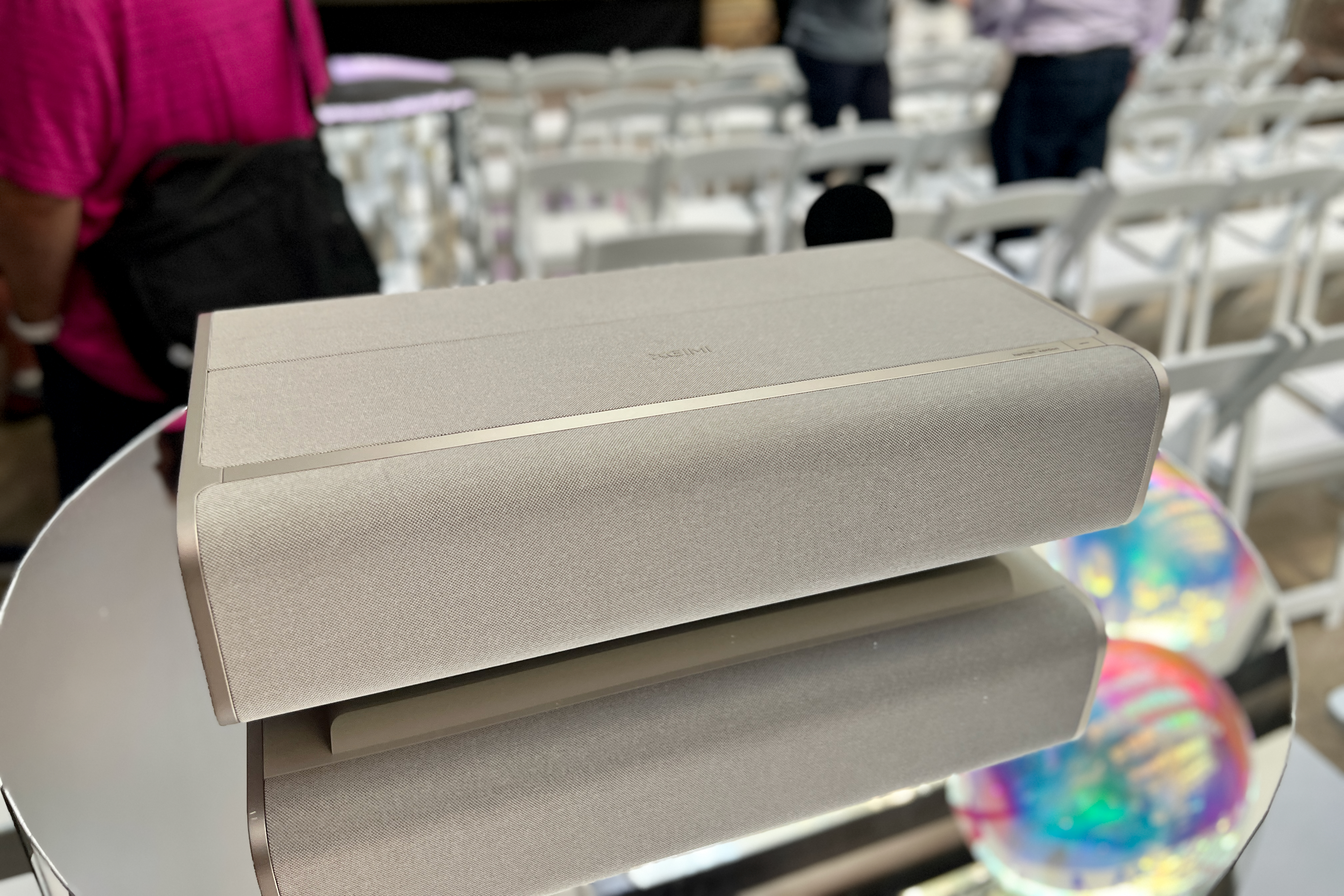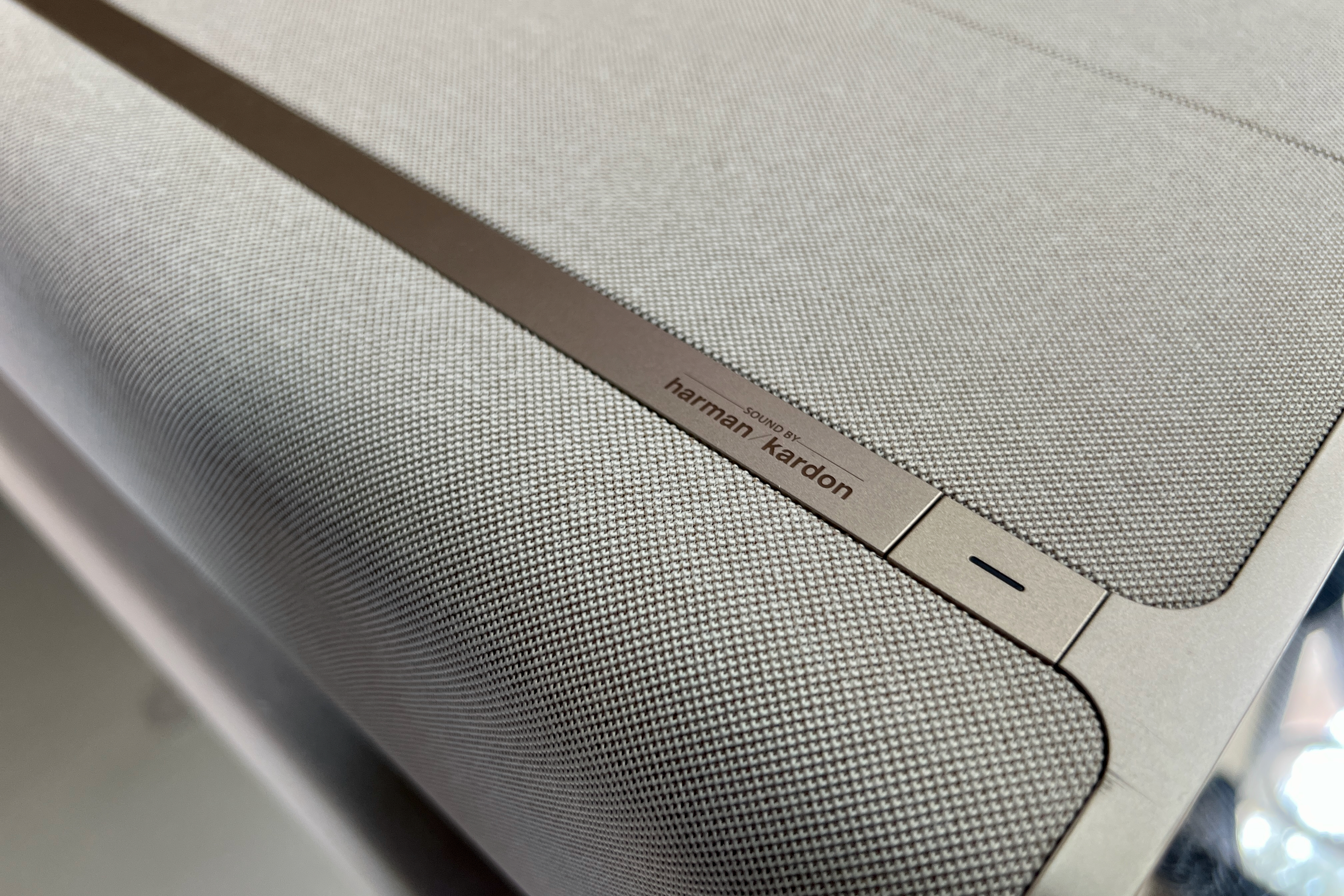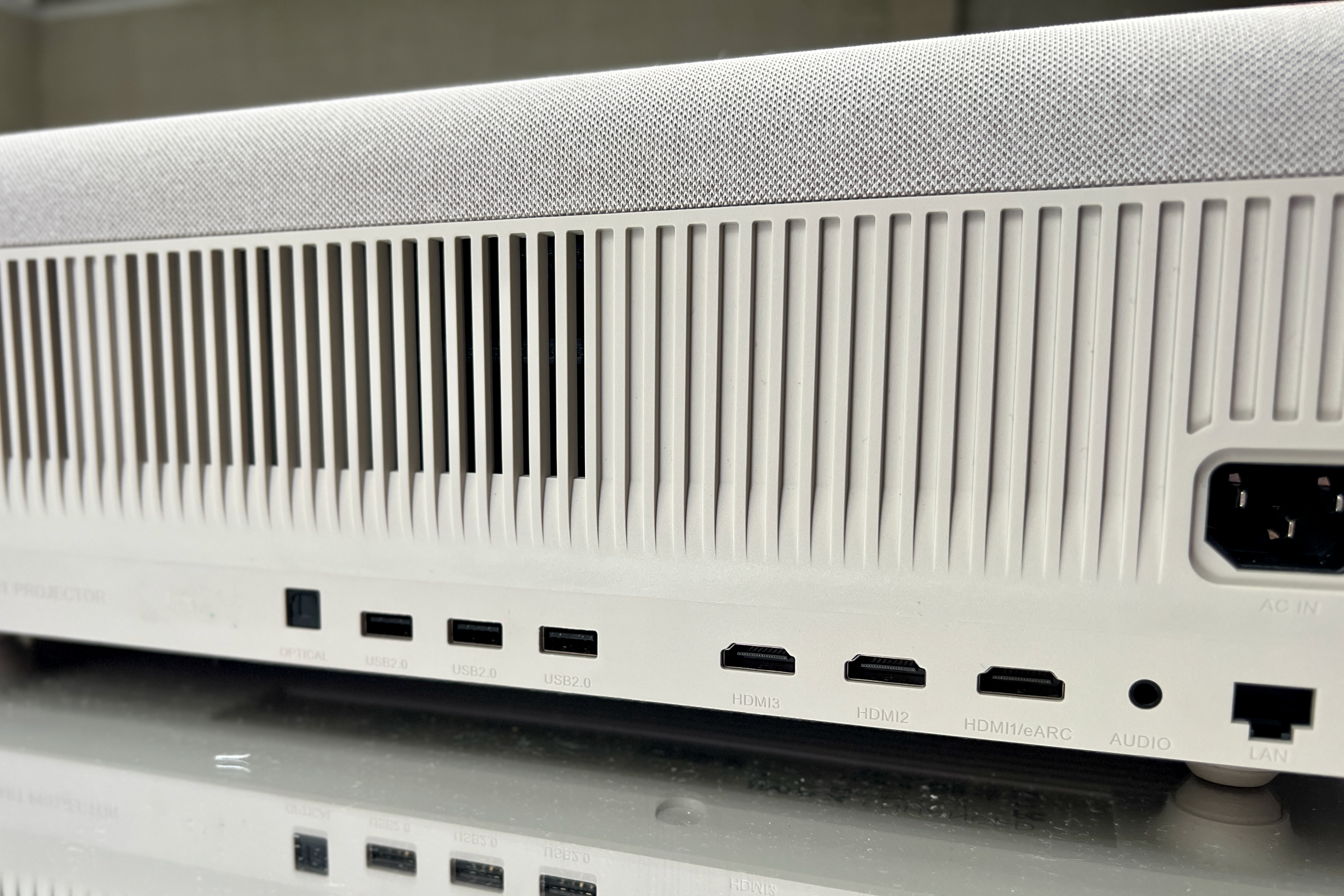After teasing us at CES 2024 way back in January with just a glimpse of its wares, thriving Chinese projector makers Xgimi today unveiled a lineup of five impossibly affordable new projectors ranging in price from $399 to $2,699. From portables with innovative swivel features to higher-resolution options with more stay-at-home premium features, Xgimi’s latest projectors bring Google TV smarts and native Netflix to some while also nudging up brightness and adding IMAX Enhanced certification to others.
MoGo 3 Pro

Ahead of their official launch today at IFA 2024 in Berlin, Xgimi showcased its new projector lineup to a handful of media at a New York event in August, and Digital Trends was there. At the Greenwich Village event, the company kicked things off with its MoGo 3 Pro, a cute and compact portable that looks more like a Star Wars droid than a projector.
Based on naming conventions alone, you’d be forgiven for thinking that the MoGo 3 Pro was just the next model version of last year’s popular MoGo 2 Pro, but you’d be wrong. While the MoGo 2 Pro has indeed been replaced (by the new MoGo 2 Plus we get into that below), the MoGo 3 Pro is a totally new beast.
With a unique cylindrical “coffee cup” form, the 2.3-pound 1080p DLP projector pops up and swivels out, powering the unit on and readying it for throwing its 450 ISO lumen image on to whatever surface you see fit and at 40 inches to 200 inches in size.
Xgimi’s excellent Intelligent Screen Adaptation (that can be found in several of its projectors), is here, too, with its auto keystone correction, auto focus, auto screen alignment, and object avoidance features actually making it hard to screw up, no matter what surface you’re projecting on to.

In our brief demo of the MoGo 3 Pro in New York, even in the relatively bright room we were in, the image was decently bright, contrast was to be expected (it would definitely improve in a more controlled environment), and its color reproduction was solid to, with 90% coverage of the DCI-P3 gamut.
The big news with the MoGo 3 Pro, however, is the step up from the MoGo 2 Pro’s Android TV operating system to Google TV (without the need of a dongle), which now also means that there is native Netflix support — no more awkward workaround to get the streaming app on the device.

Along with the new projector, Xgimi also showed off some fun accessories for the MoGo 3 Pro, including the nifty Powerbase Stand, a 20,000mAh battery that doubles as a tripod and can be broken down for easy travel; an attachable Creative Optical Filter that you can use to project trippy atmospheric images on the wall (our demo had some glowy jellyfish scenes); and a sharp-looking carrying case.
Additionally, the MoGo 3 Pro can be used as a Bluetooth speaker with its two 5-watt built-in Harman/Kardon speakers, and there’s a neat ambient light feature when you swivel the projector down to bring a glowing, colored light that you can change and have move to the music you select.
The MoGo 3 Pro is $449, but if you bundle it with the Powerbase stand ($129 on its own), it’ll run you just $499. Additionally, the Optical Filter attachment and Carrying Case are $49 and $69, respectively. We’ve now got our hands on a MoGo 3 Pro for testing, so stay tuned for your full review.
Horizon S Pro and Horizon S Max

While it didn’t command the most attention at the New York launch event (the MoGo 3 Pro kinda stole the show), those of us who saw the Horizon Max at CES this year were keen to see the final product. To our surprise, Xgimi gave us not one but two Horizon S Series projectors — the $1,299 Horizon S Pro and the more premium $1,899 Horizon S Max.
While both do not get the Google TV upgrade, they instead stick with the Android TV OS of its Horizon Ultra predecessor. But Xgimi tells me that this decision was made because for less portable projectors such as the Horizon S line and Aura 2 ultra short throw projector (below), customers are more likely to connect their own set-top streaming devices, like an Apple TV or the new Google TV Streamer, which will come with all the streaming services (including Netflix) they need. If you’re not reading between the lines, that means no native Netflix.

The Horizon S Pro and Max projectors share many of the same features, starting with Xgimi’s Dual Light 2.0 tech that combines its Tri-Color laser and LED light source for what Xgimi says is a “brighter, more accurate image while ensuring eye comfort.” They both also offer 360-degree horizontal and 135-degree vertical rotation in its innovative flexible stand, making them easy to adjust when setting up or moving around. But they also benefit from Xgimi’s Intelligent Screen Adaptation features as well. The optics are also kept safe behind a motorized sliding cover.
Both projectors are equipped with two built-in 12-watt Harman/Kardon speakers that support DTS and Dolby Audio for (from what we could hear in New York) pretty decent sound. If it’s anything like the Horizon Ultra, it’ll be good in a pinch, but you still might want to get a decent soundbar.
That main differences between the Xgimi Horizon S Pro and the Horizon S Max, apart from their price tags, are in their brightness levels and image features. The S Pro delivers 1,700 ISO lumens and has support for HDR10, HLG, and Dolby Vision HDR formats, while the S Max levels all that up to 3,000 ISO lumens (a 30% jump from the Ultra) and adds an IMAX Enhanced certification to the picture capabilities.
Xgimi Elfin Flip

The Elfin Flip is a more affordable and pared-down version of the well-received Elfin compact projector that featured a brighter 600 ISO lumens of brightness and that ran on the Android TV OS. We did get a good glimpse of the Flip in action at the company’s launch event, too, and it looks cool, compact, and decently bright.
With the tag line “Cinematic Experience in a Compact Package,” the Elfin Flip’s $399 price tag makes it a super-affordable option (the original Elfin is $649) for not only those who want the ability to take their movies and TV shows with them in a bag or backpack but business types with the need for a presentation projector on the go. The obvious new trick up its sleeve, though, is its swivel stand that offers 150-degrees of tilt so you can adjust the picture to a variety of projection angles and situations. It folds up nicely to become part of the projector’s body.
With the Elfin Flip, you’re giving up a few things for that $250 savings, most notably a dip in brightness to a still-decent 400 ISO lumens and the swap from the Android TV OS to a custom Xgimi OS that the company says is built on webOS, which can be found in all of LG’s smart TVs. The good news is that it comes with native Netflix installed as well as all the access to the other streaming apps you need.

Additionally, you also still get the Elfin’s 1080p resolution image that can throw a huge picture on your wall or screen from just a few feet away, the same dual, 3-watt Harman/Kardon speakers, and excellent auto keystone and screen alignment features for setup.
The Xgimi Elfin Flip is available starting today for $399, but can be had for the early bird price of $299 until at least through Black Friday/Cyber Monday, Xgimi tells me.
Aura 2 UST

Next up is the second iteration of Xgimi’s sole ultra short throw projector, the Aura 2. For those who are challenged for space in their homes, a UST projector like the Aura 2 (with a 0.177:1 throw ratio) only needs a handful of inches from the wall or screen to be setup. The Aura 2 improves on the first version significantly with a bump in brightness from 1,800 to 2,300 ISO lumens, while coming in at a more than manageable $2,699.
The Aura 2 shares the Horizon S’s Dual Light 2.0 technology, its support for HDR10, HLG, and Dolby Vision formats and IMAX Enhanced certification. On the color and contrast end of things, the Aura 2 covers 99% of the DCI-P3 color gamut and has a contrast ratio of 1,000,000:1, which means colors should be accurate and vivid and the black levels should hold up in brighter rooms — the demos at the launch event looked OK, but we won’t know until we test them for ourselves.
UST projectors like the Aura 2 are capable of throwing huge 4K UHD images, with the Aura 2 peaking at up to 150-inches in size. This can be done on a clean wall, a standard projector screen, or on a special Ambient Light Rejecting screen — for the first time, Xgimi is now offering an ALR screen you can buy separately, too. Of course, the Aura 2 also gets all that auto image correction tech for easy setup, too.
Like the Horizon S lineup, the Aura 2 hangs on to the Android TV OS, but most people will prefer to connect their own streaming devices or a Blu-ray player to it anyway. There are three HDMI inputs, including one eARC port for connecting all your sources, three USB inputs, as well as 3.4 mm and Optical audio out, too. Speaking of audio, Harman/Kardon is embedded in the Aura 2, too, with four built-in 15-watt speakers.
MoGo 2 Plus and Halo+ redux

Additionally, Xgimi also announced that two of its existing portable 1080p projectors will be relaunching with new versions that feature Google TV support now, too. First up is a new Halo+ “(New)” model that’s $799 and available today on Xgimi’s website.
Then in October, a new MoGo 2 Plus model will replace both the popular MoGo 2 and MoGo 2 Pro projector that we loved, and will launch exclusively at Walmart for $299.
Both of these new projectors feature the same specs as their existing models — including 700 ISO and 400 ISO lumen brightness, respectively, and built-in speakers with Dolby Audio — as well as new remote controls with a dedicated Netflix button.








